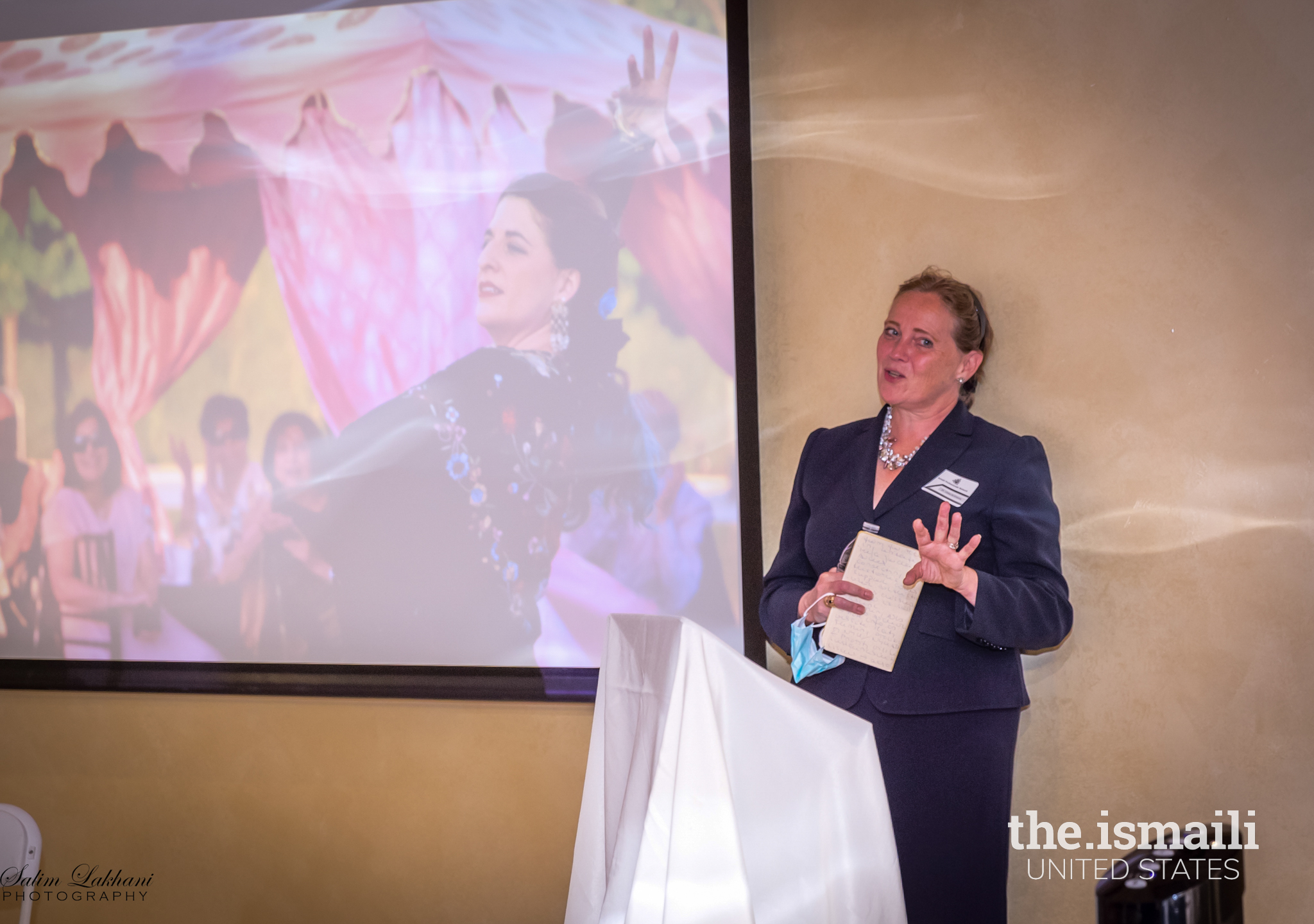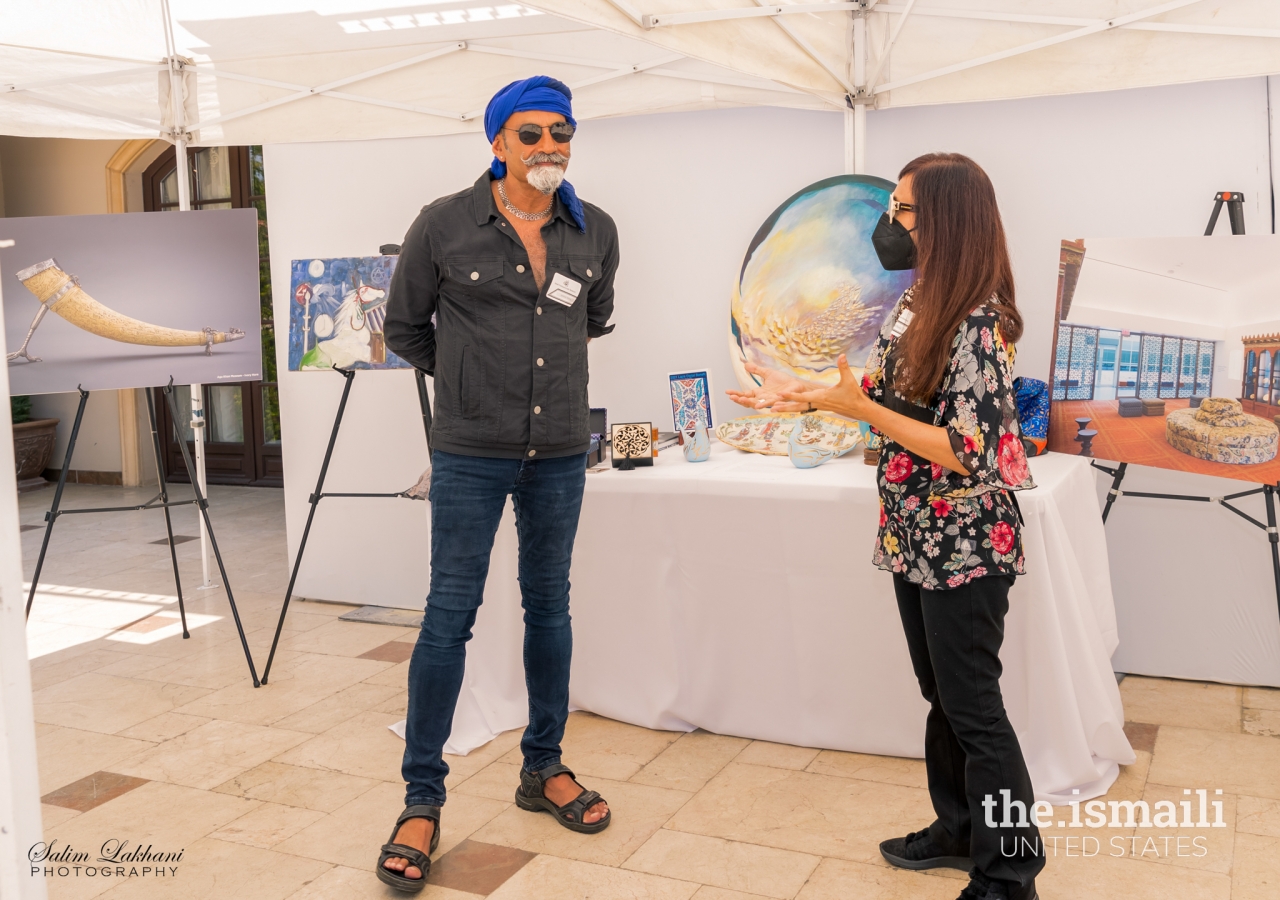An Aga Khan Museum (AKM) team visited Los Angeles at the end of July and the Jamat and others had the opportunity to interact with them. Dr. Ulrike Al-Khamis CEO of AKM, and Amirali Alibhai, AKM ‘s Head of Performing Arts, met with members of the Jamat and also met with the leadership of the Getty Center, the Fowler Museum at UCLA, and Grand Performances.
AKM’s mission is to “educate and inspire, ”and to exhibit the arts from Islamic traditions and civilizations. The series of events during this visit, the first to Los Angeles, began on Friday night at Los Angeles HQ Jamatkhana where Dr. Ulrike and Amirali spoke to a full room about the future of the Museum post-Covid.
The museum reopened a year ago, and Dr. Ulrike was appointed CEO to guide it into this new environment. Her vision for the museum is centered around five initiatives, and she provided examples of each:
On site experiences at the Toronto location - Including picnics, arts festivals, the animation of the Museum’s exterior walls, and further performing arts shows and concerts.
Exhibitions in the Museum - Ensuring that the permanent and temporary collections contain art and objects that connect to museum-goers, and share lessons from the past that can teach about the present and the future.
Podcast - Continuing This Being Human Podcast which provides listeners stories about being Muslim, hosted by Abdul-Rehman Malik.
Museum without walls - Expanding this online membership that gives users access to museum exhibitions, art talks, and presentations without having to be in person.
Educational Efforts - Expanding this online initiative that teaches students and educators around the world about Islam through the arts. Three hundred teachers and 12,000 students were trained last year
The objective of the current initiatives is to meet people where they are physically, understand where they are in their knowledge of Islamic art; through storytelling, performing arts, and contemporary art, to connect them to Islamic civilizations and their accomplishments. To learn more about the current exhibitions and programming, please visit the Museum website.
One afternoon, the AKM leadership met with members of the Ismaili Professionals Association (IPN) to discuss these initiatives. The event allowed IPN members the chance to ask questions about the Museum and get to know the AKM team.
The same evening, a public event allowed attendees an opportunity to experience a musical performance, similar to one they might attend at the museum itself. AKM, the Ismaili Council, and the Pakistan Arts Council, co-hosted Pakistani singer Ali Sethi and Discotan as part of the Grand Performances in downtown Los Angeles.
IPN-AKM Pic 1 - AO7I0848 (1)

Several thousand people attended the performance and , including Shahras Asim, Deputy Pakistan Consul-General in Los Angeles, and the former Consul-General, Jalil Abbas Jilani.
The setting sun provided a red and gold backdrop for the Discotan beats and Ali Sethi’s melodic singing. The crowd was excited and danced and sang in rhythm with the music, enjoying the warm night together. This performance and its impact reflected the value of partnerships, cultural pluralism, and the diversity within Islam theat AKM wants to share with the world.
The Pakistan Arts Council has been collaborating with Grand Performances for 15 years, allowing the public to enjoy free performances. Said Hina Abidi, President of the Council, “Pakistan has a thriving and vibrant art and music scene and an incredibly diverse culture and that is what Pakistan Arts Council proudly showcases and celebrates. Today, we are presenting Ali Sethi, a very humble person, and a musical sensation, whose song “Pasoori” has topped the Spotify global music chart.”
On the final day, Dr. Ulrike and Amirali reiterated the Museum’s values to patrons and in a panel discussion about the Museum’s programming. The event was held in the newly renovated Hilton Hotel in Santa Monica, and began with a small concert by Farah Mitha.
President of the Ismaili Council for the Western United States, Rahim Karmali, shared his thoughts about the impact of the Museum, that “we are so excited to reflect on where it will be in 15-30 years,” based on the initiatives Dr. Ulrike and Amirali had presented earlier.
Dr. Ulrike then shared the story of Toronto artist Ekow Nimako’s City of Kumbi Saleh, that the Museum recently acquired. This utopian city from the Empire of Ghana is constructed of black Legos, and serves to educate museum-goers, as well as empower young artists, to tell the story of an ancient Islamic empire. It is a magnificent work, currently on tour in Houston at the African American Museum, and stirs conversation about Islam.
Dr. Ulrike and Amirali then remarked that they will continue to seek ways to facilitate intercultural dialogue through art, poetry, and music. The Museum will be hosting a Flamenco festival, as this traditional dance has roots from Indian, African, and Spanish traditions, and will bring together many diverse communities.
Both Dr. Ulrike and Amirali feel that the pandemic opened their horizons on what is possible through the digital domain, and they are excited to explore ways to empower and connect to their audience.
The Aga Khan Museum has reopened for in-person visits and continues to share online content through Museum without Borders. There is so much to discover and experience.












